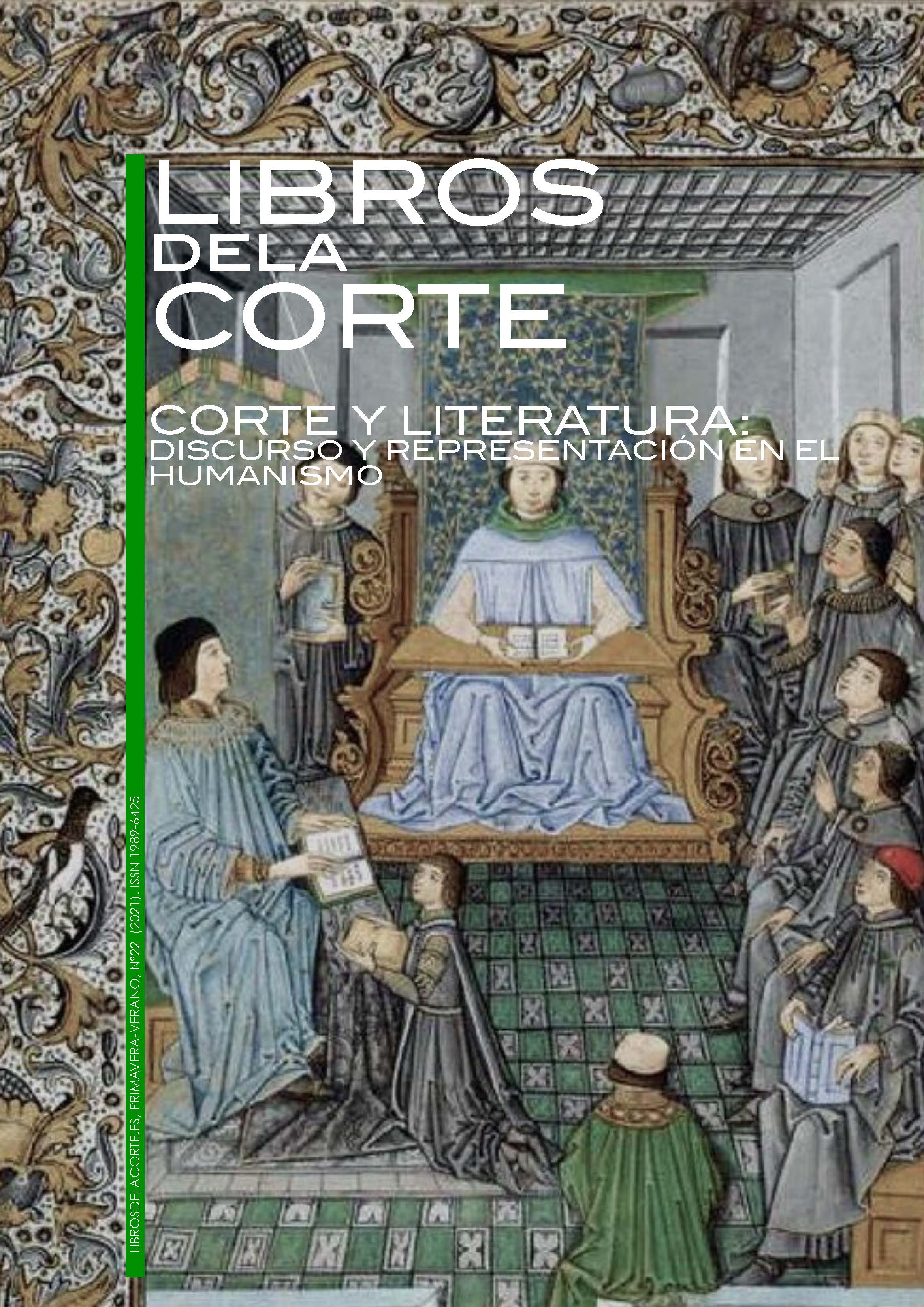Parole chiave:
Umanesimo, corte, Italia, Quatrocento, Antico regime
Questo lavoro è fornito con la licenza Creative Commons Attribuzione - Non commerciale - Non opere derivate 4.0 Internazionale.
Abstract
L’umanesimo cortigiano costituisce il fondamento di un processo che portando alla formulazione di una nuova cultura in Italia, conferirà a questa le caratteristiche che ne determineranno l’irradiamento europeo sulla base di una forza catalizzatrice che è eminentemente politica. Le ‘piccole’ corti italiane del Quattrocento funzionano, in questo, da incubatrici dei nuovi modelli di civilizzazione per le grandi corti europee dell’Antico regime.
Downloads
Riferimenti bibliografici
Ady, Cecilia, The Bentivoglio of Bologna. A Study in Despotism (Oxford: Oxford University Press, 1937).
Baldassarri, Stefano, "Introduction", in Giannozzo Manetti, Biographical Writings, ed. Stefano Baldassarri e Rolf Bagemihl (Cambridge-Londra: Harvard University Press, 2003), VII-XIX.
Baron, Hans, The Crisis of the Early Italian Renaissance. Civic Humanism and Republican Liberty in an Age of Classicism and Tyranny (Princeton: Princeton University Press, 1955).
Becker, Marvin, Florence in Transition, 2 voll. (Baltimore: Johns Hopkins University Press, 1967 1968), https://doi.org/10.1353/book.67860, https://doi.org/10.1353/book.67859.
Becker, Marvin, "The Florentine Territorial State and Civic Humanism in the Early Renaissance", in Florentine Studies. Politics and Society in Renaissance Florence, ed. Nicolai Rubinstein (Evanston: Northwestern University Press, 1968), 109-139.
Belozerskaya, Marina, Rethinking the Renaissance. Burgundian Arts across Europe (Cambridge: Cambridge University Press, 2002).
Bentley, Jerry, Politics and Culture in Renaissance Naples (Princeton: Princeton University Press, 2014), https://doi.org/10.1515/9781400858811.
Boschetto, Luca, "L'esilio volontario di Manetti", in Dignitas et excellentia hominis. Atti del Convegno Internazionale di Studi su Giannozzo Manetti, ed. Stefano Baldassarri (Firenze: Le Lettere, 2008), 117-146.
Brown, Allison, "De-masking Renaissance Republicanism", in Renaissance Civic Humanism. Reappraisals and Reflections, ed. James Hankins (Cambridge: Cambridge University Press, 2000), 179 199, https://doi.org/10.1017/CBO9780511558474.007.
Brucker, Gene, The Civic World of Early Renaissance Florence (Princeton: Princeton University Press, 1977), https://doi.org/10.1515/9781400847853.
Burdach, Konrad, Riforma, Rinascimento, Umanesimo [1935] (Firenze: Sansoni, 1986).
Conversini da Ravenna, Giovanni, Two Court Treatises, ed. Benjamin G. Kohl e James Day (Monaco: Wilhelm Fink Verlag, 1987).
Da Padova, Marsilio, The Defensor Pacis, ed. Alan Gewirth (New York: Columbia University Press, 1956).
Emerton, Ephraim, Humanism and Tyranny. Studies in the Italian Trecento (Cambridge: Harvard University Press, 1925), https://doi.org/10.4159/harvard.9780674333178.
Farbaky, Péter, "Florence and/or Rome? The Origins of Early Renaissance Architecture in Hungary", in Italy & Hungary. Humanism and Art in the Early Renaissance, ed. Péter Farbaky e Louis A. Waldman (Firenze: Olschki, 2011), 345-367.
Feuer-Tóth, Rózsa, Art and Humanism in Hungary in the Age of Matthias Corvinus (Budapest: Akadémiai Kiadó, 1990).
Garin, Eugenio, "La letteratura degli umanisti", in Storia della Letteratura Italiana. III. Il Quattrocento e l'Ariosto (Milano: Garzanti, 1966), 7-353.
Garin, Eugenio, L'educazione in Europa, 1400/1600 [1957] (Roma-Bari: Laterza, 1976).
Greenblatt, Stephen, The Swerve. How the World Became Modern (New York-Londra: W. W. Norton, 2011).
Huizinga, Johan, Le déclin du Moyen Âge (Parigi: Payot, 1919).
Jones, Philip, The Italian City-State. From Commune to Signoria (Oxford: Clarendon Press, 1997).
Kaufmann, Thomas DaCosta, Court, Cloister & City. The Art and Culture of Central Europe, 1450-1800 (Chicago: University of Chicago Press, 1995).
Kristeller, Paul Oskar, Renaissance Thought II. Papers on Humanism and the Arts (New York: Harper Torchbooks, 1965).
Kristeller, Paul Oskar, "La diffusione europea dell'umanesimo italiano" [1962], in Il pensiero e le arti nel Rinascimento, ed. Paul Oskar Kristeller (Roma: Donzelli, 1998), 75-94.
Martelli, Mario, "Profilo ideologico di Giannozzo Manetti", Studi Italiani 1 (1989): 5-41.
Martines, Lauro, The Social World of the Florentine Humanists, 1390-1460 (Princeton: Princeton University Press, 1963). https://doi.org/10.1515/9781400879052
Martines, Lauro, Potere e fantasia. Le città stato nel Rinascimento [1979] (Roma-Bari: Laterza, 1981).
Monfasani, John, "Umanesimo italiano e cultura europea", in Il Rinascimento italiano e l'Europa. I. Storia e Storiografia, ed. Marcello Fantoni (Costabissara: Angelo Colla, 2006), 49-70.
Pocock, J. G. A., The Machiavellian Moment. Florentine Political Thought and the Atlantic Republican Tradition (Princeton: Princeton University Press, 1975).
Pontano, Giovanni, De Magnanimitate [1498], ed. Francesco Tateo (Firenze: Istituto Nazionale di Studi sul Rinascimento, 1969).
Rabil, Albert, Jr., ed., Renaissance Humanism. Foundations, Forms and Legacy. I. Humanism in Italy (Philadelphia: University of Pennsylvania Press, 1988).
Rees, Valery, "Marsilio Ficino and the Rise of Philosophic Interests in Buda", in Italy & Hungary. Humanism and Art in the Early Renaissance, ed. Péter Farbaky e Louis A. Waldman (Firenze: Olschki, 2011), 127-148.
Ricciardelli, Fabrizio, "Giannozzo Manetti, un intellettuale al potere", in Dignitas et excellentia hominis. Atti del Convegno Internazionale di Studi su Giannozzo Manetti, ed. Stefano Baldassarri (Firenze: Le Lettere, 2008), 279-300.
Seigel, Jerrold, "'Civic Humanism' or Ciceronian Rhetoric? The Culture of Petrarch and Bruni", Past and Present 34 (1966): 3 48, https://doi.org/10.1093/past/34.1.3.
Seznec, Jan, The Survival of Pagan Gods [1940] (New York: Pantheon Books, 1953).
Signorini, Maddalena, "Giovanni Malpaghini", in Dizionario Biografico degli Italiani, LXVIII (Roma: Istituto della Enciclopedia Italiana, 2007), ad vocem. Disponibile in www.treccani.it [data di consultazione: 28/2/2021].
Skinner, Quentin, The Foundations of Modern Political Thought. I. The Renaissance (Cambridge: Cambridge University Press, 1978), https://doi.org/10.1017/CBO9780511817878.
Strong, Roy, The Spirit of Britain. A Narrative History of the Arts (Londra: Jonathan Cape Ltd., 1999).
Trinkaus, Carl, In Our Image and Likeness. Humanity and Divinity in Italian Humanist Thought, 2 voll. (Chicago: University of Chicago Press, 1970).
Weiss, Roberto, The Spread of Italian Humanism (Amherst: Da Valley Books, 1964).
Woodward, William H., Vittorino da Feltre and Other Humanist Educators (Cambridge: Cambridge University Press, 1890).
